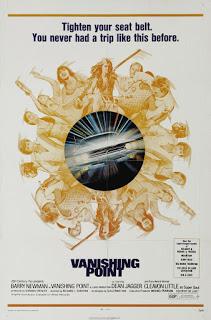
Directed By: Richard C. Sarafian
Starring: Barry Newman, Cleavon Little, Dean Jagger
Tag line: "It's the maximum trip... at maximum speed"
Trivia: Charlotte Rampling had a role as a hitchhiker whom Kowalski met while en route, but her scenes were deleted before the US release
Director Richard C. Sarafian’s 1971 film Vanishing Point plays like a modern-day western, with its hero Kowalski (Barry Newman) thumbing his nose at the law as he travels the highways of the west, dodging police cars and helicopters to reach his destination as quickly as possible. With plenty of action and even a little pathos, Vanishing Point is one of the seminal road pictures of the 1970s, and it has lost none of its charm over the years.
Employed as a cross-country driver, Kowalski (armed with nothing more than a handful of uppers) hops into a white 1970 Dodge Challenger in Denver, Colorado on Friday evening, promising to deliver it to its new owner in San Francisco by Monday morning. In fact, Kowalski is so eager to finish the job that he makes a side bet with his drug dealer Jake (Lee Weaver), swearing he’ll make it to California by 3 p.m. the next day!
Of course, to pull off this seemingly impossible feat, Kowalski drives that souped-up Challenger as fast as it can go, and in the process draws the attention of every cop in Colorado, Utah, and Nevada. With the help of Super Soul (Cleavon Little), a blind DJ who follows the action via the police radio frequency, Kowalski manages to avoid some of the road blocks set up to stop him. But will he reach San Francisco in time, or will fate, and the law, catch up with him first?
Vanishing Point features a number of pulse-pounding car chases; and John A. Alonzo’s gorgeous cinematography gives the movie an almost epic sensibility. But it’s Kowalski (played so well by Barry Newman) who holds the picture together. At the outset, he is an enigma; we know what his job is, yet nothing at all about the man himself. Such revelations come later in the film, by way of a series of flashbacks that reveal how life has beaten him down. A Vietnam Veteran who won the Medal of Honor, Kowalski is also a former cop (he was thrown off the force for stopping his partner from raping a girl), and the sudden death of his girlfriend (Victoria Medlin) five years earlier left him a shell of a man.
The only thing Kowalski has is his freedom, and it’s because of this that he does whatever is necessary to outrun the cops (he even takes an unexpected detour through the desert, where an old prospector, played by Dean Jagger, helps him hide from a police helicopter). We get the sense throughout Vanishing Point that Kowalski himself knows this journey could end up costing him everything, including his life. But he will fight like hell to ensure that, if this is the end, he goes out on his own terms.
Yet as imposing as Kowalski is, it’s Cleavon Little’s radio DJ Super Soul who takes his story to the next level. Calling him an American hero and “The last beautiful free soul on the planet”, Super Soul transforms Kowalski into a media sensation. He convinces thousands of his listeners to root for the feisty underdog while, at the same time, using the airwaves to speak directly to Kowalski, advising him on which routes are being watched by the police, and which are safe. Vanishing Point is, indeed, exciting and dramatic, but it’s exploring the fine line between Kowalski the man and Kowalski the myth, handled so well by director Richard C. Sarafian, that gives the film its heart and soul.
There are moments when Vanishing Point loses its way: a scene with two homosexual hitchhikers (Anthony James and Arthur Malet) will offend a good number of people; and Kowalski’s unlikely encounter with a nude beauty on a dirt bike (Gilda Texter) plays out like a teenage boy’s sexual fantasy. But with its well-staged action sequences, strong characterizations, and central theme of freedom at all costs, Vanishing Point is a motion picture that viewers of any generation can appreciate.
